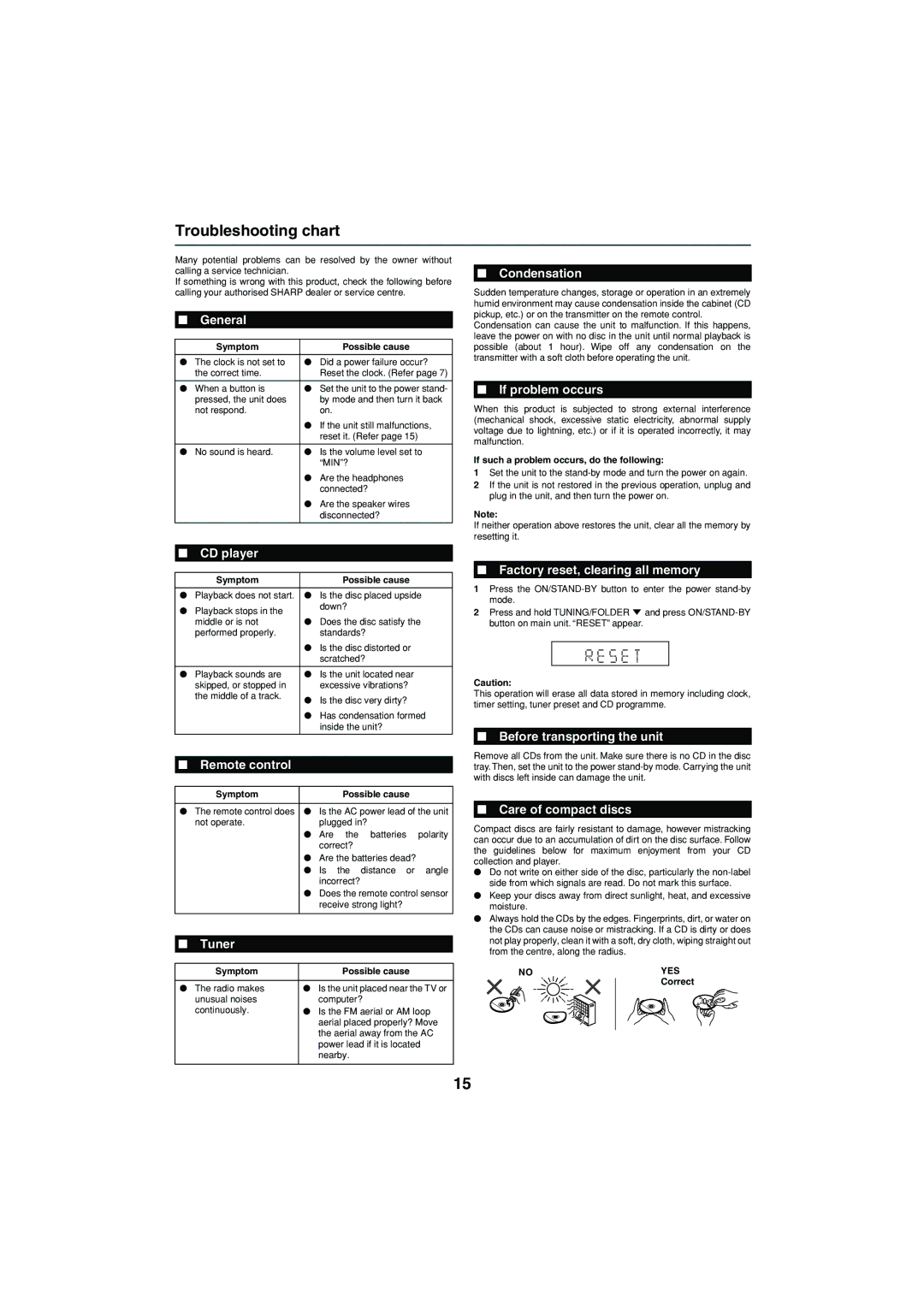
Troubleshooting chart
Many potential problems can be resolved by the owner without calling a service technician.
If something is wrong with this product, check the following before calling your authorised SHARP dealer or service centre.
■ General |
|
|
|
Symptom | Possible cause |
|
|
● The clock is not set to | ● Did a power failure occur? |
the correct time. | Reset the clock. (Refer page 7) |
|
|
● When a button is | ● Set the unit to the power stand- |
pressed, the unit does | by mode and then turn it back |
not respond. | on. |
| ● If the unit still malfunctions, |
| reset it. (Refer page 15) |
|
|
● No sound is heard. | ● Is the volume level set to |
| “MIN”? |
| ● Are the headphones |
| connected? |
| ● Are the speaker wires |
| disconnected? |
|
|
■ CD player |
|
|
|
Symptom | Possible cause |
|
|
● Playback does not start. | ● Is the disc placed upside |
● Playback stops in the | down? |
| |
middle or is not | ● Does the disc satisfy the |
performed properly. | standards? |
| ● Is the disc distorted or |
| scratched? |
|
|
● Playback sounds are | ● Is the unit located near |
skipped, or stopped in | excessive vibrations? |
the middle of a track. | ● Is the disc very dirty? |
| |
| ● Has condensation formed |
| inside the unit? |
|
|
■ Remote control |
|
|
|
Symptom | Possible cause |
|
|
● The remote control does | ● Is the AC power lead of the unit |
not operate. | plugged in? |
| ● Are the batteries polarity |
| correct? |
| ● Are the batteries dead? |
| ● Is the distance or angle |
| incorrect? |
| ● Does the remote control sensor |
| receive strong light? |
|
|
■ Tuner
Symptom | Possible cause |
|
|
● The radio makes | ● Is the unit placed near the TV or |
unusual noises | computer? |
continuously. | ● Is the FM aerial or AM loop |
| aerial placed properly? Move |
| the aerial away from the AC |
| power lead if it is located |
| nearby. |
|
|
■Condensation
Sudden temperature changes, storage or operation in an extremely humid environment may cause condensation inside the cabinet (CD pickup, etc.) or on the transmitter on the remote control.
Condensation can cause the unit to malfunction. If this happens, leave the power on with no disc in the unit until normal playback is possible (about 1 hour). Wipe off any condensation on the transmitter with a soft cloth before operating the unit.
■If problem occurs
When this product is subjected to strong external interference (mechanical shock, excessive static electricity, abnormal supply voltage due to lightning, etc.) or if it is operated incorrectly, it may malfunction.
If such a problem occurs, do the following:
1Set the unit to the
2If the unit is not restored in the previous operation, unplug and plug in the unit, and then turn the power on.
Note:
If neither operation above restores the unit, clear all the memory by resetting it.
■Factory reset, clearing all memory
1Press the
2Press and hold TUNING/FOLDER ![]() and press
and press
Caution:
This operation will erase all data stored in memory including clock, timer setting, tuner preset and CD programme.
■Before transporting the unit
Remove all CDs from the unit. Make sure there is no CD in the disc tray. Then, set the unit to the power
■Care of compact discs
Compact discs are fairly resistant to damage, however mistracking can occur due to an accumulation of dirt on the disc surface. Follow the guidelines below for maximum enjoyment from your CD collection and player.
●Do not write on either side of the disc, particularly the
●Keep your discs away from direct sunlight, heat, and excessive moisture.
●Always hold the CDs by the edges. Fingerprints, dirt, or water on the CDs can cause noise or mistracking. If a CD is dirty or does not play properly, clean it with a soft, dry cloth, wiping straight out from the centre, along the radius.
NO | YES |
| Correct |
15
